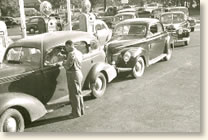|
The Japanese attack on Pearl Harbor dramatically ended the debate over America's entrance into the war that raged around the world.. On December 8, the Senate unanimously endorsed President Roosevelt's request for a declaration of war against Japan. The House followed suite with only one dissenting vote - Jeannette Rankin of Montana. Three days later, Germany and Italy - fulfilling their treaty obligations with Japan - declared war against the U.S.
 |
Motorists in Washington D.C. line
up to fill their tanks the day before
the beginning of gas rationing
May 1942 |
As eager volunteers flooded local Draft Board offices ordinary citizens soon felt the impact of the war. Almost overnight the economy shifted to war production. Consumer goods took a back seat to military production as rationing began almost immediately. It was truly a total war affecting every citizen whether soldier or worker, mother or child.
Rubber became the first commodity rationed as the Japanese invasion of the Dutch East Indies cut off our supply. Gasoline rationing reduced the number of miles the average citizen drove and thus conserved rubber. Voluntary gas rationing proved ineffective and by the Spring of 1942, seventeen Eastern states had instituted some form of mandatory gas rationing. By December mandatory controls extended across the entire country. On average, motorists who used their cars for "nonessential" purposes were restricted to 3 gallons of gas a week.
Every man, woman and child received a ration book restricting consumption of essential products. Many planted "Victory Gardens" to supplement their grocery list. By 1944, whisky had disappeared from liquor store shelves as distilleries converted to the production of industrial alcohol. New car production was banned beginning January 1, 1942 as former auto plants switched to the production of military vehicles. The ban was lifted on July 1, 1945. Thirty percent of all cigarettes produced were allocated for service men, making cigarettes a scarce commodity on the home front by 1944. By the end of the war, rationing limited consumption of almost every product with the exception of eggs and dairy foods.
References: Cohen, Stan, V for Victory, America's Home Front During World War II (1991); Reynolds, Clark, America at War, 1941-1945 The Home Front (1990).
|






